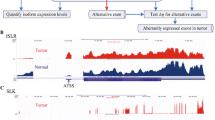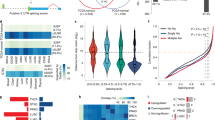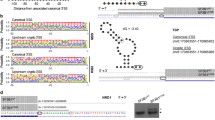Abstract
The human FAM190A gene undergoes frequent alteration in human cancer, most commonly involving in-frame deletions in exon 9 or exons 9 & 10. These deletions form novel peptide sequences, serving as presumptive cancer-specific neo antigens. However, it remains elusive whether these in-frame deletions of FAM190A could induce oncogenic properties in vivo. In this study, we aimed to explore the functional significance of in-frame deletions in FAM190A genes. We generated two deletion mutant forms, FAM190AΔexon9 and FAM190AΔexon9&10, and examined their gain-of-function effects in vitro and in vivo. Global transcript profiling in NIH3T3 cells revealed that the transcripts displaying altered expression following introduction of FAM190AΔexon9 and FAM190AΔexon9&10 were significantly enriched for genes assigned to cellular movement and cell-to-cell signaling, respectively. Furthermore, ectopic expression of FAM190AΔexon9 and FAM190AΔexon9&10 induced in vivo tumor formation in nu/nu mice. Taken together, our results are the first to demonstrate the in vivo oncogenic properties of in-frame deletions in the FAM190A gene and indicate that these transcript variants might be clinically applicable as therapeutic targets in patients with cancer.




Similar content being viewed by others
References
Bemmo A, Dias C, Rose AAN, Russo C, Siegel P, Majewski J (2010) Exon-level transcriptome profiling in murine breast cancer reveals splicing changes specific to tumors with different metastatic abilities. PLoS ONE 5:e11981
Bonomi S, Gallo S, Catillo M, Pignataro D, Biamonti G, Ghigna C (2013) Oncogenic alternative splicing switches: role in cancer progression and prospects for therapy. Int J Cell Biol 2013:17
Caceres JF, Kornblihtt AR (2002) Alternative splicing: multiple control mechanisms and involvement in human disease. Trends Genet 18:186–193
Danckwardt S, Neu-Yilik G, Thermann R, Frede U, Hentze MW, Kulozik AE (2002) Abnormally spliced β-globin mRNAs: a single point mutation generates transcripts sensitive and insensitive to nonsense-mediated mRNA decay. Blood 99:1811–1816
Dang L, Fan X, Chaudhry A, Wang M, Gaiano N, Eberhart CG (2006) Notch3 signaling initiates choroid plexus tumor formation. Oncogene 25:487–491
DuPage M, Mazumdar C, Schmidt LM, Cheung AF, Jacks T (2012) Expression of tumour-specific antigens underlies cancer immunoediting. Nature 482:405–409
Fackenthal JD, Godley LA (2008) Aberrant RNA splicing and its functional consequences in cancer cells. Dis Models Mech 1:37–42
Fungtammasan A, Walsh E, Chiaromonte F, Eckert KA, Makova KD (2012) A genome-wide analysis of common fragile sites: what features determine chromosomal instability in the human genome? Genome Res 22:993–1005
Gubin MM, Zhang X, Schuster H, Caron E, Ward JP, Noguchi T, Ivanova Y, Hundal J, Arthur CD, Krebber WJ et al (2014) Checkpoint blockade cancer immunotherapy targets tumour-specific mutant antigens. Nature 515:577–581
He C, Zhou F, Zuo Z, Cheng H, Zhou R (2009) A global view of cancer-specific transcript variants by subtractive transcriptome-wide analysis. PLoS ONE 4:e4732
Hoeijmakers JH (2009) DNA damage, aging, and cancer. N Engl J Med 361:1475–1485
Maniatis T, Tasic B (2002) Alternative pre-mRNA splicing and proteome expansion in metazoans. Nature 418:236–243
Matlin AJ, Clark F, Smith CWJ (2005) Understanding alternative splicing: towards a cellular code. Nat Rev Mol Cell Biol 6:386–398
Patel K, Scrimieri F, Ghosh S, Zhong J, Kim M-S, Ren YR, Morgan RA, Iacobuzio-Donahue CA, Pandey A, Kern SE (2013) FAM190A deficiency creates a cell division defect. Am J Pathol 183:296–303
Provost E, Rhee J, Leach SD (2007) Viral 2A peptides allow expression of multiple proteins from a single ORF in transgenic zebrafish embryos. Genesis 45:625–629
Sak K (2012) Chemotherapy and dietary phytochemical agents. Chemother Res Pract 2012:282570
Scrimieri F, Calhoun ES, Patel K, Gupta R, Huso DL, Hruban RH, Kern SE (2011) FAM190A rearrangements provide a multitude of individualized tumor signatures and neo-antigens in cancer. Oncotarget 2:69–75
Skotheim RI, Nees M (2007) Alternative splicing in cancer: noise, functional, or systematic? Int J Biochem Cell Biol 39:1432–1449
Venables JP (2004) Aberrant and alternative splicing in cancer. Can Res 64:7647–7654
Wang R-F, Wang HY (2017) Immune targets and neoantigens for cancer immunotherapy and precision medicine. Cell Res 27:11–37
Yaari G, Bolen CR, Thakar J, Kleinstein SH (2013) Quantitative set analysis for gene expression: a method to quantify gene set differential expression including gene-gene correlations. Nucleic Acids Res 41:e170–e170
Acknowledgements
This work was supported by an Incheon National University research Grant (2018-0240).
Author information
Authors and Affiliations
Corresponding author
Ethics declarations
Conflict of interest
Sung Ung Kang and Joon Tae Park declare that they have no conflict of interest.
Ethical approval
This study had been approved by the International Animal Care and Use Committee of Johns Hopkins Medicine (JHM) (protocol number: 20130112001).
Informed consent
Informed consent was obtained from all individual participants included in the study.
Electronic supplementary material
Below is the link to the electronic supplementary material.
Rights and permissions
About this article
Cite this article
Kang, S.U., Park, J.T. Functional evaluation of alternative splicing in the FAM190A gene. Genes Genom 41, 193–199 (2019). https://doi.org/10.1007/s13258-018-0752-7
Received:
Accepted:
Published:
Issue Date:
DOI: https://doi.org/10.1007/s13258-018-0752-7




